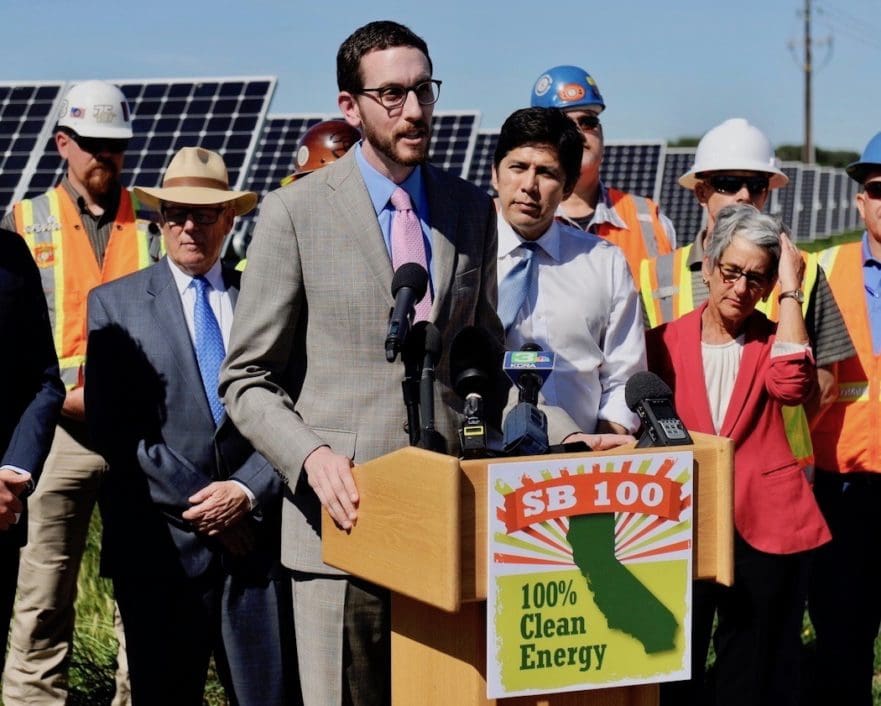Before Scott Wiener became a state senator in 2016, he served as a San Francisco supervisor for six years. Known as a “corporate Democrat,” he aggressively pushed policies that benefited his campaigns contributors in the real estate industry — and left behind an appalling legacy. Today, he’s advancing the trickle-down housing bill SB 50, which will generate billions for his political patrons, but will fuel gentrification and displacement throughout California. The following is an excerpt from the Housing Is A Human Right investigation “Selling Out California: Scott Wiener’s Money Ties to Big Real Estate.”
An Appalling Legacy
When Scott Wiener ran, in 2010, for San Francisco supervisor in District 8, he was hardly a candidate to get excited about — unless you were a real estate hotshot. It was a time when African Americans were getting shoved out of San Francisco at a disproportionately greater rate than other ethnicities; a six-year, upward trend of evictions started slamming the city’s renters (from 1,372 in 2010 to 2,304 in 2015); and San Francisco was ranked the fifth most expensive metropolis in the entire nation. But Wiener, a 40-year-old deputy city attorney who ran as an openly gay candidate in a heavily LGBT district, didn’t showcase gentrification, tenant protections, or affordability issues on the campaign trail. Instead, he talked about the “basics” of government.
For a campaign video, which essentially laid out the key planks of his “basics” platform, Wiener explained that he was keen on fixing public transportation (“Like moving away from cash fares so we can speed up the boarding process and having better spacing of bus stops”); updating the San Francisco Police Department (“Supporting Chief Gascon’s modernization of the department’s technology, the way it investigates crimes, and so forth”); and creating more jobs (“Having City Hall be a tool to help attract businesses”). That last quote was a revealing glimpse into Wiener’s political priorities — rather than emphasize that government could help people, he went the other way and held up business.
The professional class, particularly those in the influential real estate industry, thought they had a winner. They started pumping sizable checks into his campaign coffers.
“While [Rafael] Mandelman is labor’s candidate for District 8,” wrote Paul Hogarth for Beyond Chron, a San Francisco news site, in 2010, “Scott Wiener is clearly the favorite of landlords and real estate interests. A Beyond Chron review of Wiener’s filings for this quarter counted $6,175 from donors who listed ‘realtor’ (or something similar) as their occupation, $6,225 from landlords or property managers, and $2,275 from developers. If anything, these figures underestimate his real estate money — because many landlords put ‘retired’ or ‘self-employed’ as their occupations. Notable Wiener donors included Senator Dianne Feinstein, Pacific Heights fundraisers Mark and Susie Tompkins Buell, angel investors Ron and Gayle Conway, and landlord advocates Janan New and David Fix.”
By 2010, Wiener, who grew up in a New Jersey suburb outside Philadelphia, had lived in San Francisco for 13 years. He had graduated the elite Duke University in 1992 and the even more elite Harvard Law School in 1996. Within a year, in 1997, he was working in San Francisco as a litigation attorney for the international law firm Heller Ehrman White & McAuliffe, which represented such big businesses as Levi Strauss, Consolidated Foods, McDonald’s Corporation, and Northrop Grumman Corporation. Wiener moved to the San Francisco City Attorney’s Office in 2002. Associates, according to the news site SFGate, routinely described him as “hard-working.”
Yet housing activists were uneasy about exactly who Wiener would work hard for. Just before Election Day, it was revealed that San Francisco multi-millionaire real estate investor Thomas Coates, who had shelled out nearly $1 million to an unsuccessful 2008 statewide ballot measure that would have phased out rent control in California, delivered $10,000 in campaign cash to an independent expenditure committee that backed Wiener and at least $200,000 to other “moderate” candidates for the board of supervisors. (In San Francisco, elected officials, who are usually Democrats, are often referred to as either “progressive” or “moderate.” In 2018, the San Francisco Public Press rated Wiener as “the most moderate, or right-leaning” among all the city’s present-day politicians.)
San Francisco Democratic Party Chairman Aaron Peskin, who would later be rated the “most progressive, or left-leaning” member of the board of supervisors, told SFGate that Coates’ hefty contributions “threaten all San Franciscans who think elections shouldn’t be for sale.” Wiener defeated Rafael Mandelman by 2,383 votes.
(Read the full special report, “Selling Out California: Scott Wiener’s Money Ties to Big Real Estate.”)
In 2014, Wiener was re-elected to the board of supervisors, with even more enthusiastic backing from the real estate industry. The San Francisco Apartment Association, infamous landlord Russell Flynn, real estate investor Thomas Coates (once again), and all sorts of developers, realtors, and real estate players whipped out their checkbooks for Wiener. The Anti-Eviction Mapping Project, based in San Francisco, found that the real estate industry had contributed an eye-popping 41 percent of all campaign monies to Wiener’s 2014 re-election bid.
Several of those contributors included shady property owners known for mass evictions and harassing tenants. “Wiener’s district is part of ground zero for the Ellis Act,” reported the Anti-Eviction Mapping Project, referring to the controversial state law that allows a developer or landlord to evict tenants in an apartment building and then turn the property into a condo complex or boutique hotel. In effect, the law turns affordable housing into luxury housing.
Between 2011 and 2016, Wiener’s entire time as a supervisor, the Anti-Eviction Mapping Project found that 1,054 Ellis Act evictions took place in San Francisco. With an average household size of 2.3 persons, that’s roughly 2,424 people who were kicked out of their apartments to make way for luxury accomodations. Activists decried that a massive gentrification crisis was sweeping through the city.
“San Francisco’s gentrification has reached a ridiculous new extreme,” Causa Justa :: Just Cause, a Bay Area social justice group, wrote in 2014, “making it the most expensive city in the country, outstripping even Manhattan, the home of Wall Street and its corporate tycoons.”
Even the New York Times took note of San Francisco’s gentrification crisis, which was severely impacting the African American community. In a 2016 article, titled “The Loneliness of Being Black in San Francisco,” the Times reported that the “decline [of the African American population] has been steady and noticeable. One of seven residents was black in 1970. Today, it is nearly one of 20, with most of the city’s 46,000 blacks living in public housing.”
The Times further reported: “The reasons for the [African American] migration are in large measure economic: Skyrocketing real estate prices fueled by high-paying tech jobs have priced out middle-class residents of all ethnicities. But the exodus was also accelerated by a domino effect of black businesses and families moving away, many of them to Oakland and other cities along the East Bay.”
Yet Wiener didn’t go against his political patrons in Big Real Estate and advance strong anti-gentrification measures that could hurt their sizable profits. He also didn’t aggressively lobby state legislators to repeal the Ellis Act — a law that housing activists widely consider an insidious tool to gentrify middle- and working-class neighborhoods.
Instead, Wiener proposed an ordinance backed by the real estate industry that would have turned 2,000 rent-controlled units into luxury condominiums. He was also one of only two supervisors who opposed, in 2016, legislation that increased the number of the affordable housing units a developer must include in a new project — the kind of policy developers detest. “The market should be accountable to building more affordable and middle income housing and not just luxury housing,” explained San Francisco Supervisor Jane Kim.
Wiener, the longtime beneficiary of real estate campaign contributions who was already raising money from Big Real Estate for his upcoming 2016 state senate run, didn’t agree.
In addition, Wiener led the successful opposition of a 2016 “Tech Tax,” which activists supported but tech firms nixed, that could have generated $140 million annually to help build affordable housing and pay for homeless services. And he backed the victorious Proposition Q, which real estate investor and longtime Wiener contributor Thomas Coates and the tech industry funded, that further criminalized homelessness and allowed the city to clear homeless encampments. Such sweeps, advocates say, do nothing to deal with the root causes of homelessness.
John Burton, chairman of the California Democratic Party at the time, insisted that Proposition Q was only a “guise of solving a problem when it merely pushes it down the street or into other neighborhoods.” He added: “As a former elected official, one of the things that bothered me the most was elected officials who use the poor for their own political advancement.”
Wiener carried out the wishes of his campaign contributors in Big Real Estate and Big Tech — the tech industry is another major source of campaign cash for Wiener. But his refusal to increase funding for affordable housing and homeless services coupled with his backing for homeless sweeps would leave behind an appalling legacy.
In January 2018, the United Nations special rapporteur on adequate housing, Leilani Farha, toured San Francisco to investigate homelessness. She told the San Francisco Chronicle she was “completely shocked” by the conditions on the streets. Months later, in October 2018, she concluded in a report that San Francisco’s handling of its homeless was “cruel and inhuman treatment” and a “violation of multiple human rights.”
Apparently, Wiener didn’t care about that legacy. Around the same time that the U.N. released its findings, he opposed another San Francisco ballot measure, Proposition C, which the tech industry also tried to stop. It sought to tax the city’s largest businesses to create more money for homeless services. For this go-around, Wiener and Big Tech didn’t win — the initiative was overwhelmingly approved, with 60 percent of the vote.
Read the full special report, “Selling Out California: Scott Wiener’s Money Ties to Big Real Estate.”

